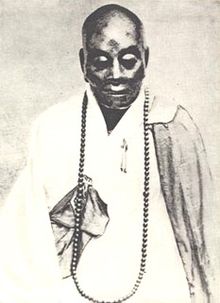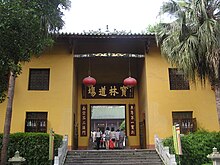Huineng
Dajian Huineng | |
|---|---|
 | |
| Title | Chán master 6th Chán Patriarch |
| Personal | |
| Born | 638 |
| Died | 713 (aged 75) |
| School | Chán |
| Senior posting | |
| Teacher | Daman Hongren |
| Predecessor | Daman Hongren |
| Successor | Official Patriarchy ends |
Dajian Huineng (大鑒惠能; Pinyin: Dàjiàn Huìnéng; Japanese: Daikan Enō; Korean: Hyeneung, 638–713) was a Chinese Chán (Zen) monastic who is one of the most important figures in the entire tradition. Huineng is the Sixth and Last Patriarch of Chán Buddhism.
He is said to have advocated an immediate and direct approach to Buddhist practice and enlightenment, and in this regard, is considered the founder of the "Sudden Enlightenment" (頓教) Southern Chán school of Buddhism. His foremost students were Nanyue Huairang, Qingyuan Xingsi, Nanyang Huizhong, Yongia Xuanjue and Heze Shenhui.
Biography
The two primary sources for Huineng's life are the preface to the Platform Sutra[1] and the Transmission of the Lamp.[2]
Huineng was born into the Lu family in 638 A.D. in the town of Xing in Guangdong province. His father died when he was young and his family was poor, so he did not have the chance to learn to read or write. He may have been a Hmong or a Miao.[3] One day, while he was delivering firewood to an inn, he heard a guest reciting the Diamond Sutra and he had an awakening. He immediately decided to seek the Way of Buddhahood. The guest gave him ten taels of silver to provide for his mother, and Huineng embarked on his journey. After travelling for thirty days on foot, Huineng arrived at Huang Mei Mountain, where the Fifth Patriarch Hongren presided.
From the first chapter of the Platform Sutra:
I then went to pay homage to the Patriarch, and was asked where I came from and what I expected to get from him. I replied, "I am a commoner from Hsin Chou of Kwangtung. I have travelled far to pay you respect and I ask for nothing but Buddhahood." "You are a native of Kwangtung, a barbarian? How can you expect to be a Buddha?" asked the Patriarch. I replied, "Although there are northern men and southern men, north and south make no difference to their Buddha-nature. A barbarian is different from Your Holiness physically, but there is no difference in our Buddha-nature."
Hongren immediately asked him to do chores in the rice mill. Huineng stayed to chop wood and pound rice for eight months.
Becoming the Sixth Patriarch

One day, Hongren announced,
The question of incessant rebirth is a momentous one. Day after day, instead of trying to free yourselves from this bitter sea of life and death, you seem to go after tainted merits only (i.e. merits which will cause rebirth). Yet merits will be of no help if your Essence of Mind is obscured. Go and seek for Prajna (wisdom) in your own mind and then write me a stanza (gatha) about it. He who understands what the Essence of Mind is will be given the robe (the insignia of the Patriarchate) and the Dharma (the ultimate teaching of the Chán school), and I shall make him the Sixth Patriarch. Go away quickly.
Delay not in writing the stanza, as deliberation is quite unnecessary and of no use. The man who has realized the Essence of Mind can speak of it at once, as soon as he is spoken to about it; and he cannot lose sight of it, even when engaged in battle.
However, the disciples said to each other that they didn't need to write any gathas, and that surely their teacher and head monk, Venerable Shenxiu, would become the Sixth Patriarch. So only Shenxiu wrote a gatha for Hongren. As the head monk, Shenxiu was well-respected and under great pressure to produce a gatha that would qualify him as the next patriarch. However, he was uncertain as to his own understanding, and eventually decided to write a poem anonymously on the wall in the middle of the night, announcing his authorship only if Hongren approved.[4] It stated:
The body is a Bodhi tree,
the mind a standing mirror bright.
At all times polish it diligently,
and let no dust alight.
When the disciples saw this gatha on the wall, there was a great stir. When Hongren saw it, he told them, "Practice according to this gatha, you will not fall into the evil realms, and you will receive great benefits. Light incense and pay respect to this gatha, recite it and you will see your essential nature." All the disciples praised and memorized the gatha.
However, privately, Hongren told Shenxiu, "You have arrived at the gate, but haven’t entered it. With this level of understanding, you still have no idea what the supreme Bodhi mind is. Upon hearing my words, you should immediately recognize the original mind, the essential nature, which is unborn and unceasing. At all times, see it clearly in every thought, with the mind free from all hindrances. In the One Reality, everything is real, and all phenomena are just as they are."
Hongren asked Shenxiu to compose another gatha that demonstrated true understanding. Shenxiu tried hard but couldn’t come up with another verse.
When a young novice passed the rice mill chanting Shenxiu's gatha, Huineng immediately knew this verse lacked true insight. He went to the wall, and asked a district officer there to write a poem of his own for him. The officer was surprised, "How extraordinary! You are illiterate, and you want to compose a poem?" Whereupon Huineng said, "If you seek supreme enlightenment, do not slight anyone. The lowest class may have great insights, and the highest class may commit foolish acts." In veneration, the officer wrote Huineng’s gatha on the wall for him, next to Shenxiu's, which stated:
Bodhi originally has no tree.
The bright mirror also has no stand.
Fundamentally there is not a single thing.
Where could dust arise?
菩提本無樹,
明鏡亦非台;
本來無一物,
何處惹塵埃?

Huineng then went back to rice pounding. However, this gatha created a bigger stir; everyone was saying, "Amazing! You can’t judge a person by his looks! Maybe he will become a living bodhisattva soon!" However, when the alarmed Hongren came out, he just casually said, "This hasn’t seen the essential nature either," and proceeded to wipe the gatha off with his shoe.
One night, Hongren received Huineng in his abode, and expounded the Diamond Sutra to him. When he came to the passage, "to use the mind yet be free from any attachment," Huineng came to great enlightenment—that all dharmas are inseparable from the self nature. He exclaimed, "How amazing that the self nature is originally pure! How amazing that the self nature is unborn and undying! How amazing that the self nature is inherently complete! How amazing that the self nature neither moves nor stays! How amazing that all dharmas come from this self nature!"
Hongren told Huineng, "If one recognizes the original mind and the original nature, he is called a great man, teacher of gods and humans, and a Buddha." He passed the robe and begging bowl as a symbol of the Dharma Seal of Sudden Enlightenment to Huineng.
Although this story is as clearly stated as it can be, it should also be noted that Huineng was not permitted to make himself known as the Sixth Patriarch until later on. This was due to the fear that his fellow monks might be angered that he had been made the Sixth Patriarch and not Shenxiu or one of the other monks who had seniority over him.
Quotes
When alive, one keeps sitting without lying down. When dead, one lies without sitting up. In both cases, a set of stinking bones! What has it do with the great lesson of life? With those who are sympathetic Let us have discussion on Buddhism. As for those whose point of view differs from ours Let us treat them politely and thus make them happy. (But) disputes are alien to our School, For they are incompatible with its doctrine. [1]
After death
The mummified body of Huineng is kept in Nanhua Temple in Shaoguan Prefecture (northern Guangdong).[5]
Huineng's body was seen by the Jesuit Matteo Ricci who visited Nanhua Temple in 1589. Ricci told the European readers the story of Huineng (in a somewhat garbled form), describing him as somewhat akin to a Christian ascetic. Ricci names him Lusu (i.e. 六祖, "The Sixth Patriarch").[6]
Notes
- ^ Pine 2006
- ^ 释道原, ed. (宋·景德). "卷五·慧能". 景德传灯录. Beijing, China: 北京国学时代文化传播有限公司. Retrieved 25 March 2009.
{{cite book}}: Check date values in:|date=(help) - ^ Stirling 2006, pg. ix
- ^ Watts 1962, pp.111-113
- ^ Images of Huineng's temple and Mummy
- ^ De Christiana expeditione apud Sinas, Book Three, Chapter 1. Pages 222-224 in the English translation: Louis J. Gallagher (1953). "China in the Sixteenth Century: The Journals of Matthew Ricci", Random House, New York, 1953. The Latin original text, De Christiana expeditione apud Sinas suscepta ab Societate Jesu can be found on Google Books.
See also
References
- Pine, Red. The Platform Sutra: The Zen Teaching of Hui-Neng. (2006) Counterpoint. ISBN 1-59376-177-5.
- Stirling, Isabel. Zen Pioneer: The Life & Works of Ruth Fuller Sasaki (2006) Shoemaker & Hoard. ISBN 978-1-59376-110-3
- Watts, Alan W. The Way of Zen (1962) Great Britain: Pelican books. ISBN 0140205470
External links
- more images of Huineng's mummy
- Legends in Chan:the Northern/Southern Split, Hui-neng and the Platform Sutra
- Platform Sutra of Hui Neng
- The Platform Sutra of the Sixth Patriarch: the text of the Tung-Huang Manuscript translated by Philip B Yampolsky (introduction and notes omitted)
- Hui Neng Page
